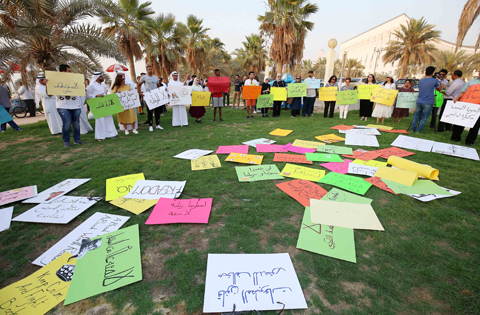 KUWAIT: Activists gather in Irada Square opposite yesterday to protest against the banning of books by the information ministry. – Photo by Yasser Al-Zayyat
KUWAIT: Activists gather in Irada Square opposite yesterday to protest against the banning of books by the information ministry. – Photo by Yasser Al-ZayyatKUWAIT: Around 80 activists gathered in Irada Square opposite the National Assembly yesterday to protest against the banning of books by the information ministry. This was the second gathering by the activists after they held a similar protest in front of the information ministry on Sept 1, 2018.
Dr Fatima Al-Matar, a teacher at the Faculty of Law of Kuwait University, criticized the arbitrary resolutions of the information ministry to ban books. “We came today to say no to banning books and no to restricting free thinking and freedom. We will always protest against the arbitrariness of the ministry. We previously met the minister who gave us many promises including changing the censorship committee and amending the publications law, particularly articles 7 and 21, which deal with banning books. We demanded post-censorship instead of pre-censorship - the same way newspapers are treated, for instance,” she told Kuwait Times.
The ministry has banned 4,570 books from being sold in Kuwait in the past few years. “Books are an essential and basic right of people, and we do not agree with the bans. We will continue protesting until the promises of the minister are fulfilled. Although some people don’t care much for the ban as they believe they can buy these books online, I think those who censored these books can also ban the import of these books or block the websites selling them. I know a person who wanted to import a number of books for his personal use but was not allowed to collect them from the customs,” Matar said.
She said the ban is not reasonable or logical for most books. “One of the examples is banning a novel by Kuwaiti author Buthayna Al-Eisa (Kharayet Altayh) over fears that it will affect the relationship with Saudi Arabia, while this novel is sold in Saudi Arabia. Also, some books were banned merely over the image on the cover. Mermaid, a children’s book, was banned because the mermaid is wearing a bra. Another book was banned because it contains the word God, although Kuwait respects all religions,” Matar added.
“We chose this time for the sit-in as the book fair is approaching. And we set this location because they didn’t allow us to gather in front of the ministry as we did in our first protest. The police indirectly threatened us that they may cancel our gathering if the ministry demanded so. For the safety of the activists, we gathered here,” concluded Matar.
Author Buthayna Al-Eisa attended the protest holding a book by Henry Muller, which according to her represents the policy of the ministry in banning books. “He wrote a book about books - The Books in My Life - which was banned in Kuwait. My novel Kharayet Altayh (The Maps of Loss) was banned two years ago and is still outlawed, although it’s sold in all other countries including Saudi Arabia,” she explained.
She published it in Beirut and couldn’t distribute it in Kuwait. “The novel is about a boy who gets lost during the hajj pilgrimage, and an organ trafficking gang kidnaps him. It tells how this gang was pursued and how the parents dealt with this situation. The censorship department accused my novel of provoking regime overthrow and not respecting public morals. Simply, it’s a Taleban-esque policy,” Eisa said.
Adnan Abbas, a Kuwaiti who participated in the protest, said it’s not correct to prevent people from reading certain books. “I think that if one or few books are immoral, they still shouldn’t be banned. Instead we can counter these books with other correct books. This ban and censorship have badly affected the community. In the end, people can still buy these books outside Kuwait and read them. We are already facing difficulty in finding books that are not banned, and now more books are being banned. This is really unacceptable,” he said.
By Nawara Fattahova










